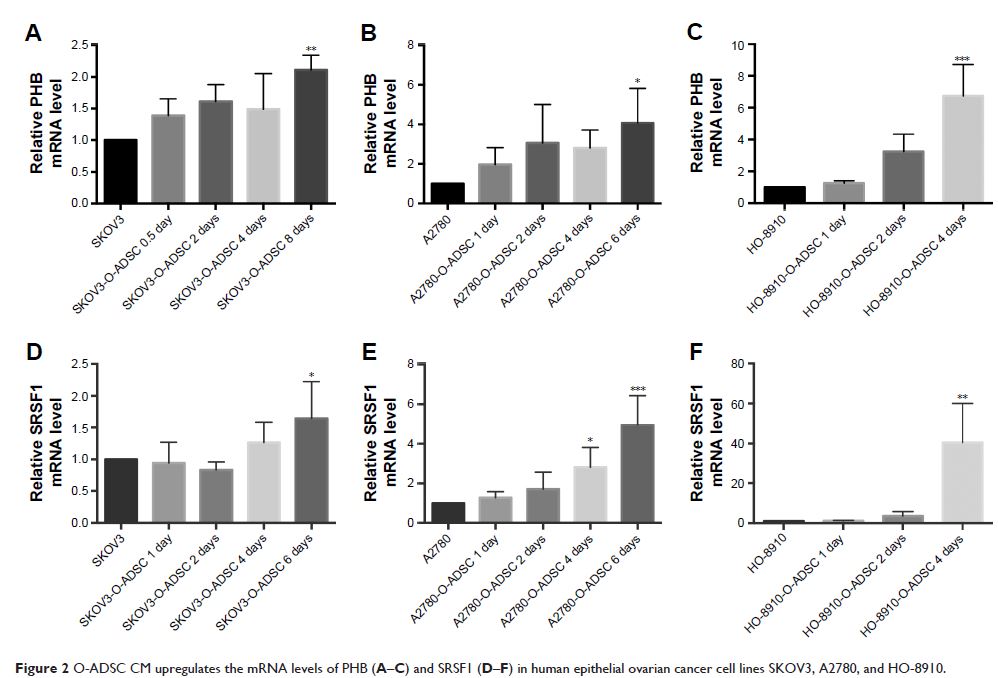109568
论文已发表
注册即可获取德孚的最新动态
IF 收录期刊
- 3.4 Breast Cancer (Dove Med Press)
- 3.2 Clin Epidemiol
- 2.6 Cancer Manag Res
- 2.9 Infect Drug Resist
- 3.7 Clin Interv Aging
- 5.1 Drug Des Dev Ther
- 3.1 Int J Chronic Obstr
- 6.6 Int J Nanomed
- 2.6 Int J Women's Health
- 2.9 Neuropsych Dis Treat
- 2.8 OncoTargets Ther
- 2.0 Patient Prefer Adher
- 2.2 Ther Clin Risk Manag
- 2.5 J Pain Res
- 3.0 Diabet Metab Synd Ob
- 3.2 Psychol Res Behav Ma
- 3.4 Nat Sci Sleep
- 1.8 Pharmgenomics Pers Med
- 2.0 Risk Manag Healthc Policy
- 4.1 J Inflamm Res
- 2.0 Int J Gen Med
- 3.4 J Hepatocell Carcinoma
- 3.0 J Asthma Allergy
- 2.2 Clin Cosmet Investig Dermatol
- 2.4 J Multidiscip Healthc

人网膜脂肪来源的间充质干细胞条件培养基改变体外上皮性卵巢癌细胞系的蛋白质组学特征
Authors Zhang YL, Dong WH, Wang JJ, Cai J, Wang ZH
Received 5 December 2016
Accepted for publication 2 February 2017
Published 17 March 2017 Volume 2017:10 Pages 1655—1663
DOI https://doi.org/10.2147/OTT.S129502
Checked for plagiarism Yes
Review by Single-blind
Peer reviewers approved by Dr Ashok Kumar Pandurangan
Peer reviewer comments 2
Editor who approved publication: Dr William Cho
Abstract: Mesenchymal stem cells (MSCs) have been reported to participate in the
formation of supportive tumor stroma. The abilities of proliferation and
invasion of human epithelial ovarian cancer (EOC) cells were significantly
enhanced when indirectly cocultured with human omental adipose-derived MSCs
(O-ADSCs) in vitro. However, the underlying mechanisms remain poorly
understood. In this study, EOC cells were cultured with conditioned medium (CM)
from O-ADSCs (O-ADSC), and the effect of O-ADSC CM on the proteomic profile of
EOC cells was assessed by two-dimensional gel electrophoresis (2-DE), followed
by liquid chromatography and tandem mass spectrometry. The 2-DE assays revealed
a global increase in protein expression in the EOC cells treated with CM. Nine
proteins were identified from 11 selected protein spots with differential
expression after treatment with CM from O-ADSCs. All the nine proteins have
been linked to carcinoma and apoptosis, and the migration ability of tumor
cells can be regulated by these proteins. Moreover, the upregulation of
prohibitin and serine/arginine-rich splicing factor 1 in EOC cells treated with
CM was further confirmed by quantitative real-time polymerase chain reaction.
These results suggest that O-ADSCs affect the proteomic profile of EOC cells
via paracrine mechanism in favor of EOC progression.
Keywords: ovarian cancer, mesenchymal stromal
cells, mesenchymal stem cells, omentum, proteomic
